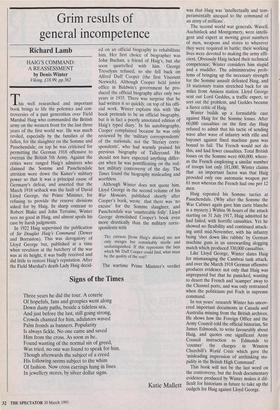Grim results of general incompetence
Richard Lamb
HAIG'S COMMAND: A REASSESSMENT by Denis Winter Viking, f18.99, pp.362 This well researched and important book brings to life the polemics and con- troversies of a past generation over Field Marshal Haig who commanded the British army on the western front for the last three years of the first world war, He was much reviled, especially by the families of the fallen, for the slaughter on the Somme and Passchendale; on top he was criticised for permitting the German 1918 offensive to overrun the British 5th Army. Against the critics were ranged Haig's admirers who claimed the Somme and Passchendale attrition wore down the Kaiser's military power so that it was a principal cause of Germany's defeat, and asserted that the March 1918 setback was the fault of David Lloyd George, the Prime Minister, for refusing to provide the reserve divisions asked for by Haig. In sharp contrast to Robert Blake and John Terraine, Winter sees no good in Haig, and almost spoils his case by harsh judgments. In 1922 Haig supervised the publication of Sir Douglas Haig's Command (Dewer and Borraston). This was derogatory of Lloyd George but, published at a time when revulsion at the butchery of the war was at its height, it was badly received and did little to restore Haig's reputation. After the Field Marshal's death Lady Haig decid- ed on an official biography to rehabilitate him. Her first choice of biographer was John Buchan, a friend of Haig's, but she soon quarrelled with him. George Trevelyan refused, so she fell back on Alfred Duff Cooper (the first Viscount Norwich). Although Cooper held junior office in Baldwin's government he pro- duced the official biography after only two years in 1935. There was surprise that he had written it so quickly, on top of his offi- cial work. Winter explains this with 'the book pretends to be an official biography, but is in fact a poorly annotated edition of Haig's typed diary.' In his autobiography, Cooper complained because he was only reviewed by the 'military correspondents' of the nationals, not the liteiary corre- spondents', who had warmly praised his previous biography of Talleyrand. He should not have expected anything differ- ent when he was pontificating on the red- hot military controversy of the day. The Times found the biography misleading and worthless.
Although Winter does not quote him, Lloyd George in the second volume of his War Memoirs, published shortly after Cooper's book, wrote that there was 'no excuse' for the Somme slaughter, and Passchendale was 'unutterable folly'. Lloyd George demolished Cooper's book even more drastically than the military corre- spondents with
The extracts [from Haig's diaries] are not only meagre but remarkably sterile and undistinguished. If this represents the best which Mr Duff Cooper could find, what must be the quality of the rest?
The wartime Prime Minister's verdict
was that Haig was 'intellectually and tem- peramentally unequal to the command of an army of millions'.
The second world war generals, Wavell, Auchinleck and Montgomery, were intelli- gent and expert at moving great numbers of men, weapons and stores to wherever they were required in battle; their working lives were devoted to making the army effi- cient. Obviously Haig lacked their technical competence; Winter considers him stupid and a muddler. The administrative prob- lems of bringing up the necessary strength for the Somme assault defeated Haig, and 18 stationary trains stretched back for six miles from Amiens station. Lloyd George sent out Lord Geddes, a traffic expert, to sort out the problem, and Geddes became a fierce critic of Haig.
Winter builds up a formidable case against Haig for the Somme losses. After 60,000 casualties on the first day Haig refused to admit that his tactic of sending wave after wave of infantry with rifle and bayonet against fixed machine guns was bound to fail. The French would not do this, and had fewer casualties. Total British losses on the Somme were 600,000, where- as the French employing a similar number of troops lost only 181,000. Winter claims that an important factor was that Haig provided only one automatic weapon per 61 men whereas the French had one per 12 men.
Haig repeated his Somme tactics at Passchendale. (Why after the Somme the War Cabinet again gave him carte blanche is a mystery.) Within 96 hours of the attack starting on 31 July 1917, Haig admitted he had failed, with horrific casualties. Yet he showed no flexibility and continued attack- ing until mid-November, with his infantry being 'shot down like rabbits' by German machine guns in an unrewarding slogging match which produced 330,000 casualties.
Like Lloyd George, Winter slates Haig for mismanaging the Cambrai tank attack, and over the March 1918 German offensive produces evidence not only that Haig was unprepared but that he panicked, wanting to desert the French and 'scamper' away to the Channel ports, and was only restrained when the politicians put Foch in supreme command.
In ten years' research Winter has uncov- ered important documents in Canada and Australia missing from the British archives. He shows how the Foreign Office and the Army Council told the official historian, Sir James Edmonds, to write favourably about Haig, and quotes one significant Army Council instruction to Edmonds to `counter' the charges in Winston Churchill's World Crisis which gave the `misleading impression of unthinking stu- pidity in the British High Command'.
This book will not be the last word on the controversy, but the fresh documentary evidence produced by Winter makes it dif- ficult for historians in future to take up the cudgels for Haig against Lloyd George.


















































 Previous page
Previous page